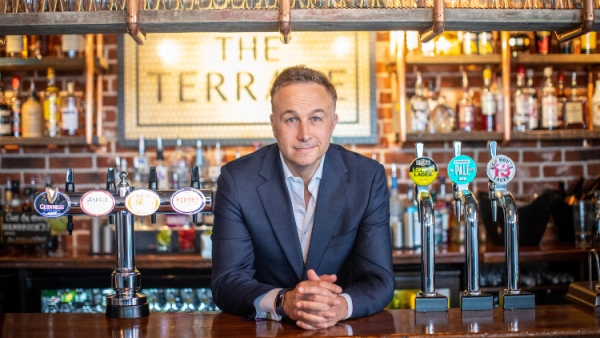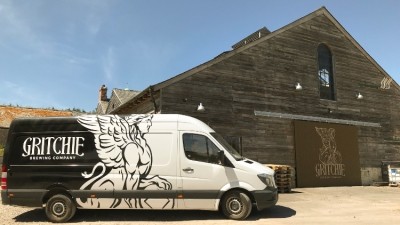Big interview
'Please judge us on our track record' says Stonegate boss

It’s not so much David slaying Goliath, but more like David taking Goliath out for a drink before marrying his daughter and moving into his house. In a year of shock announcements, there might have been a sense of fatigue when it came to the news that relative minnow Stonegate was aiming to swallow up the pubco giant Ei Group.
But the announcement still seemed to wrongfoot the industry. Up until now, Stonegate, through its owners TDR Capital, had certainly been aggressive on acquisitions, but the deals had generally involved pockets of pubs and smaller groups.
The deal, if it goes through, will see the 700-strong Stonegate swallowing a whopping 4,000 pubs, many of them in the tenanted and leased space, an area outside of the company’s current focus on managed operations. Stonegate’s CEO Simon Longbottom is clearly looking forward to the challenge. He says the Ei operation is a good fit with his business: “We like the asset base, in truth, the pub base. There’s a southern and city centre bias to it and I think we can add a lot of value to those pubs. Although it comes in one big chunk of 4,000 pubs, it’s very complementary to what we’re doing.”
He says the deal started with TDR’s ambitions. “They’ve owned the business for nine years now and there came a point when they were looking at options at what was going to happen next, and they were genuinely keen to see Stonegate keep growing.”
And growing is an understatement, should the Ei deal go through, it will be an explosion in growth, with Stonegate taking over several thousand tenanted operations, as well as Ei Group’s fledgling managed businesses, which includes Bermondsey, Craft Union and its various managed expert operations.
Get the basics right at night
As well as a broad portfolio of pubs and bars, Stonegate is also a key player in the late-night market and LGBTQ+ sector, both of which have certainly proved tough of late. However, Longbottom is committed to both areas and says there’s no secret to Stonegate’s success: “There’s no magic to it. We find it a very profitable part of our business, we’ve got confidence and continue to invest in it.
“It’s about the basics, about investment, having the right people, people who care and working in partnership with local authorities.
“It’s about not running away from the late-night economy, but to embracing it, finding solutions and tackling the issues.”
He says one area they’re tackling is the perception of the sector in political circles: “We’ve done a lot around raising awareness among MPs about the late night economy. Late night can get a bad reputation. But when we reopen a business, we invite local MPs to come, and 20% of our late-night business have seen local MPs in the business seeing the challenges and the good that it is bringing to the local economy and town. We’re very proud of that.”
He also highlights the investment the company has made regarding safety: “We’ve now got 90% of our licensees as part of a safety or community programme, working with local authorities, and nine out of 10 of those working in such schemes feel relationships with the authorities has improved. Stonegate also spends £27m on security, every year in the business.”
But for any naysayers in the sector, Longbottom is bullish: “I would simply say to people, please judge us on our track record. I think we’ve demonstrated over the past 12 deals that we’ve built competency around integration. We’ve invested in all the pubs we’ve acquired. And we’ve been very successful – the returns on investment have been strong.
“The people who have joined us have been given opportunities to grow, to develop and we’ve invested in them. This year, we’ve got 1,100 people on formal learning, so we’ve got a track record there.”
Clearly, Ei comes with some baggage, but Longbottom is confident the merger will maintain the recent positive momentum within the business: “I can’t change some of the history of how Enterprise grew very fast: smoking bans and recessions, and some of the history, it’s not for me to comment on.
“What I can say, having worked with Simon [Townsend, Ei CEO] and Neil [Smith, Ei chief finance officer] on the deal, is we were very impressed by recent improvements .”
He says he’s keen to continue to build on that. “We’ll look at every business and decide what is the right operating style for it – is it a great leased and tenanted business? Great we’ll invest in that.
“Does it have potential as a managed site within one of our formats? If so, it’ll get an investment and move into managed when and if it’s available.
“There’s also Craft Union, we really like the franchised model, it’s simple and clearly working well – there’s lots of enthusiasm for it, and we look forward to learning more about it.”
All decisions made on individual pubs will be fully considered, he insists: “We’ve got to work within the framework of agreements and law, so we’re clearly not going to be doing anything that’s outside of that framework of agreement, or the Landlord and Tenant Act.”
With a background of running Greene King’s tenanted and leased operations, is Longbottom looking forward to getting his teeth back into the tenanted sector?
“God yes! I loved that period of time, you know it’s dynamic and hugely inspiring – watching how people grow their own business.”
He’s keen to reassure operators that Stonegate is committed to the model: “We want to run a high-quality leased and tenanted estate, and we think that’s complementary to what we’re doing in Stonegate. Yes, we’ve been drink-led and managed to date, but there’s lots of opportunities for us to be successful in leased and tenanted.
“I ran Greene King’s leased and tenanted business for four to five years and was impressed with what I saw in terms of the limited due diligence we could do on Ei. Clearly I’m looking forward to getting to know all the good folk there, understanding all the pubs and meeting the tenants and lessees and finding out for myself, and then we can make some judgements.
“I said this in my Greene King days. The best pubs in the company were in the leased and tenanted estate. The level of entrepreneurship, level of innovation and dedication, these were some of the best licensees in the country, and I’ve no doubt, as I get to know the Ei estate, it will be the same. The track record of individual entrepreneurs is a great part of the pub sector and a great part of the story.
“I’ve always been a big advocate of the tenanted model. It’s a tremendous model in terms of shared interest between a pubco and an individual.”
However, he is keen to point out that the managed model has a place as well: “Equally, Stonegate has demonstrated what scale, what levels of investment and backing, research propositions and brands can bring to a pub, bar or late-night venue.
And we’re very proud of those levels of investment we’ve put in – £300m in the past five or six years.
“But to put those investments in, you need some of those managed techniques and controls. Our job is to make the right decisions on the pubs and give the community the right offer it deserves.”
Outside of T&L, one area he’s keen to get to grips with is Ei’s runaway success story Craft Union. “It’s very smart. It’s quite a disrupter on the high street – it’s bringing levels of investment to pubs that haven’t seen it for decades. It’s a very polished offer. We’ve seen it going head to head with Stonegate businesses, and challenging us, so it’s something we’re really looking forward to learning more about.”
For now, Longbottom and the Stonegate team will have to wait to get their hands on their new toy, but he’s relaxed about that. “We’re hoping for quarter one of next year, but we’re in the authority’s time scale. They will want to examine this. There’s obviously been some bigger deals, but we’ll just have to await the results.
“Until then, the two businesses are running entirely separately, getting on with our own businesses and, fingers crossed, we’ll get a date, and we can get on with integrating the two.”
And for staff in Solihull, who are nervous about what the future holds, he’s keen to point out that one of the key strengths in Stonegate is its development opportunities: “The people side what we’re most proud of. Ian [Payne, chairman] started talking about bar to boardroom and we wanted Stonegate, in the early days, to stand for something.
“We had taken pubs other people didn’t want. And would certainly say Stonegate hadn’t got the best assets in the sector, but we could do something pretty dramatic about culture. Also it’s about people, so it starts with that vision – we want to restore the country’s pub heritage, we want to run the best managed high street, drink-led group of pubs.”
To do that, the company invests strongly in training and development. “We laid out that visible career ladder, so people can say, ‘OK I get it, I know what I’m aiming for’.”
That has led to a strong focus on internal promotion, and Longbottom says they’ve now got 300 general managers in the business that have gone through the internal training systems to reach that position.
“The focus is very much on leadership. Yes, you can run a pub at Accolade level, which is deputy manager level, but to really be successful at GM level, you need those leadership skills, you need to know how to lead.
“We’ve now got 20 area managers, and the same again in our head office support team that have come from the GM side.
“There’s been a buzz around Stonegate for some time – if you want to grow your career quickly, there are lots of opportunities.
“We’ve got 2,500 colleagues in Stonegate who have completed courses and gone on to do all kinds of different things, and that’s something Stonegate is proud of and is giving to industry and to young people, to get them trained and get their careers off to a good start.”
While there’s plenty still to do to get the Ei deal over the line, he’s confident that Stonegate is in position to step up to the challenge the deal presents: “We’re not boastful from Luton, but having done 12 deals, there’s not many in the sector that have been as busy as us – that has led to a competence when it comes to integrating business.
“Yes, the size is different, but a lot of the processes and thinking you’re going to go through is entirely similar.”
So time will tell, but with an excellent track record across plenty of acquisitions, it looks like David and Goliath could be set for a beautiful new future.
The bottom line on...
The pubs code
Simon Longbottom exited Greene King prior to the pubs code coming into effect, but he was involved in the discussions in the run-up and was working under a voluntary code during his tenure at the pub company.
However, he’s not concerned about coming under its remit: “The code of practice and scrutiny has been a good thing in improving quality in T&L sector - that’s quality at the recruiting/application stage and ensuring there is transparency, full knowledge and that there’s training and a fair deal.
“The market works best when that deal is a win-win and I’ve never come away from that.”
However, he feels the code was overkill: “There wasn’t anything wrong with the tenanted model. It didn’t need this level of scrutiny, co-ordination, legislation – delete as appropriate. It doesn’t appear to need it in all the pub companies with fewer than 500 sites – the family brewers – which continue to thrive without it.
“I felt the model that I was involved in, the Greene King model, where there was clear shared interest, was working perfectly well, and that was what I’ve talked to MPs about when we were going through the select committee.
“I can see with the longer leases – where the individual operator was often putting up more capital and that agreement was a long one – how improving the structure within those agreements and working together was needed. And that has been a good thing in terms of some of the longer commercial agreements that came with those leases.
“But when I look at results of the market-rent-only (MRO) option, there have been some individual licensees who have benefited from it but the success story has been the improvement in transparency and quality that the code has brought.
“But from my view of the tenanted model – where I was sitting in Greene King and talking to colleagues of those family brewers – didn’t need it.
“I didn’t see great issues in the tenanted model, and a need for a third party to be examining the model in the detail it is now and the legislation around it.”
Longbottom says it has created a two-tier system where one pub company can be running the tied tenanted model outside of the code, while another, larger business with the same model is under that scrutiny, and he feels that doesn’t make sense.
Changing consumer demands
“I get asked about this a lot,” says Longbottom. “Particularly investors asking me questions about Stonegate.
“There is this sort of top-down view that people are drinking less and young people aren’t going out as much, and everyone eating vegan food. The sort of headlines from the Daily Mail that everyone believes.
“But actually it’s lazy isn’t it? When you look at it, the drinks-led market has been in growth for a number of years and it’s forecast to continue growing, because people are drinking differently.
“They want back-stories. They’re interested in local and unique, and they’re interested in experimenting – all of those areas are ones we’ve looked to adapt our brands and formats into over the past four or five years.”
He says Stonegate has actively sought to embrace the younger consumers coming through.
“We’ve been so bullish about that market, the Millennial market if you like, that we’ve even got a division called our Millennial division. Because we don’t think there are any changes to the psyche of this country, or in our bones, that we like to socialise.
“We talk about the third space because we believe in it. That place that isn’t work, that isn’t home, where you can be you, where you can support your team, where you can listen to your music, where you can be with your friends. That’s hugely important to this country and our heritage, and huge part for me in solving mental health problems and loneliness issues.
“Millennials aren’t any different, they just don’t want to drink in the pubs that you or I drank in or our dads drank in, so why wouldn’t we want to give them something they wanted.”
And that means rethinking the surroundings, he says: “Let’s strip the buildings back, let’s lose the Victoriana and use some of those prompts of pub heritage. Let’s put something in that’s different, new and contemporary. Let’s look at tank beer, quality pizzas, the craft beer range. Let’s use our skills at transitioning a building from brunch through to late night.”
He highlights Stonegate’s work with its Common Room format. “We’re incredibly proud of that. It’s a true offer that works in the student towns and cities in this country. Is it a pub, bar or coffeehouse? I don’t think we’d like to pin the tail on the donkey, it’s a bit of all of them.
“It’s a bit like Loungers. It’s different to everything else in casual dining. And Common Room is too. No one’s doing anything like Common Room. It’s a clever, well-thought-through proposition that’s appealing to students and young professionals in the major cities and towns.”
Ultimately, when it comes to the changing consumer trends, he says it’s an issue of mindset: “We’re not looking at a part of the drinking-out market and saying this looks a problem.”
Business rates
“We’re behind Kate [Nicholls, UKHospitality CEO], we want a fair deal. I’ve always felt that business rates penalise investment – you invest and then get re-appraised and penalised for investing in the high street, it’s crazy.”
He said there’s an ongoing frustration that different types of operators, particularly those that aren’t in bricks and mortar, don’t pay their fair level of tax to “UK PLC”.
“For every pound that goes over our bars, tax is around 43p or 44p. We’re being overtaxed in industry that’s providing significant employment and training to young people.
“It’s a supervised environment for consumption of alcohol, it’s a community room if you like, a meeting point, all of those things, and we demand that the Government should look at a fairer tax regime.
“Some 52% of employees are under 25. The flexibility we’re offering, the training that we’re offering, the start in life, often career life for people. And the investment into our businesses. This isn’t being recognised.”
He said the creation of UKHospitality has helped provide a focus for their argument: “For the first time, in the past 18 months, we’ve got cohesion and clarity going to the decision makers.
“We have said in the past that my organisation wasn’t going to get involved because we weren’t getting the message across, but now Kate’s got a hold of that and we’re backing her fully.”
The B word
“I can give you Stonegates’s views, not mine. Mine are unprintable,” says Longbottom with a wry laugh.
“Ultimately, our customers aren’t eating or drinking differently because of Brexit, and anyone in the sector saying differently is kidding you, I don’t believe it.
“Are we concerned about any particular areas? The biggest concern for me is immigration and the link to employment. I don’t hear any decision makers talking about the lower pay sector, or the more flexible working that hospitality and other industries offer.
“We’re kidding ourselves if we don’t think there’s not been people from around the world starting out in lower paid sectors where they’re being trained to work. So that makes me nervous.”
Overall, around 10% of Stonegate’s staff are from EU countries, so the company isn’t overly exposed but he says that doesn’t mean they aren’t concerned.
“We are nervous and we’d like to understand – if and when we leave – what that policy will look like.”
On the product side, he’s more relaxed: “We’re wet-led, and most drinks are brewed and distilled in this country. On the food side, there’s some scare stories coming out around fresh food and ease of movement, but I’m sure we can flex and manage that.”
Ultimately, he says they remain confident, despite the uncertainty: “Look, we wouldn’t be bidding £3bn for Ei Group if we weren’t confident in this country and the economy, and our ability to invest and borrow money.
“We would like them to sort it out though. If for no other reason than we can then talk about something else!”











